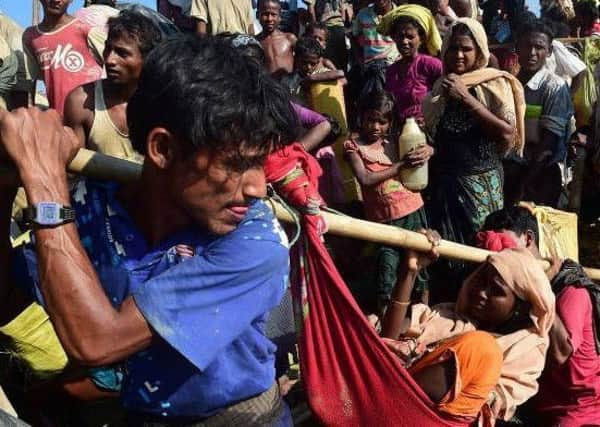Roddy Gow: Scottish links with Myanmar mean that we cannot turn a blind eye


Whilst the human suffering is not in question, there is considerable disagreement as to where responsibility lies and what should be done to end the violence and displacement.
Myanmar was once called Burma and from 1824 to 1948 it was governed by the British as a colony, known often as ‘the Scottish Colony’, due to the role played by Scotsmen in running the country.
Advertisement
Hide AdAdvertisement
Hide AdOne of the most notable was Sir James Scott and the Irrawaddy Flotilla Company (IFC). The IFC was Scottish-owned and managed by P Henderson & Company from Glasgow. It grew to be the largest river boat company in the world with more than 600 vessels, carrying eight million passengers and one and a quarter million tons of cargo a year.


Against this background, the UK’s historic links suggest that we should be spearheading efforts to deal with the mass displacement of people. We could certainly lead an initiative to investigate the situation and encourage involvement by the United Nations. In his excellent book The Rohingyas, Inside Myanmar’s Hidden Genocide, Azeem Ibrahim writes: “It is not enough for foreign powers to hide behind the ready belief that nothing they can say or do will influence the regime (in Myanmar) … international silence will be interpreted as international disinterest – removing one of the few barriers standing between the Rohingyas and genocide.”
Paul Scully MP, currently a trade representative for Burma, Thailand and Brunei, writes: “The Bangladeshis’ worst-case scenario is that all 1.3 million Rohingya come over the border. The best is that the Burmese military needs to end its disproportionate response to attacks from the militant group Arakan Rohingya Salvation Army (ARSA).”
Elizabeth Kennedy of Independent Diplomat, the non-profit diplomatic advisory group based in New York and London, says: “Since 25 August, the Myanmar military has carried out a campaign of mass atrocities against the Rohingya, causing more than half a million refugees to flee to Bangladesh. UN Secretary-General Antonio Guterres has called the situation ‘the world’s fastest developing refugee emergency and a humanitarian and human rights nightmare’.
“Rohingya groups want governments to match their rhetoric with concrete action. Specifically, governments should scale up humanitarian support for refugees in Bangladesh and intensify pressure on Myanmar to allow humanitarian access to Rakhine state, where the atrocities took place.”


Keith Win, an expert on Myanmar who was born there, has monitored the business environment for the last 20 years. He tells me that the problems in Rakhine can be traced back to the 19th century, with Bengali workers brought in for infrastructure, transport and farming requirements.
He says: “After the Second World War, the situation was exacerbated in 1948 when militant Muslims, who had migrated from Bengal, demanded an Islamic state and started a jihad resulting in the deaths of 30,000 – 40,000 local Buddhists and ethnic groups and started a war of attrition that went on until the mid to late 50s.
“The current situation which has led to such widespread suffering was set in train on 25 August, when terrorists (ARSA) attacked 30 border police outposts resulting in the death of 12 police officers, who were hacked and beheaded.
Advertisement
Hide AdAdvertisement
Hide Ad“The timing is also significant and it would appear it was purposefully chosen, as it was a couple of weeks before the start of the UN General Assembly and the day after the release of a report by Kofi Annan to resolve the northern Rakhine problems. These recent events have set in train a vicious cycle of violence which it is difficult to control.”
Despite these problems, Myanmar still attracts investment and trade from companies in the East but this will diminish rapidly if the situation is not resolved.
Thai Myint-U, writing in the FT, said: “The outside world is absolutely right to prioritise the crisis at hand. It is equally important, though, to jettison once and for all the Myanmar fairy tale, and to appreciate that working in Myanmar means working with a near-failed state.”
The UK should take urgent steps to halt the violence and restrain the Myanmar government and those of us connected with the original Scottish Colony should speak out. Our current preoccupation with Brexit is no excuse for not intervening and leading a strong international response. The creation of “safe zones” to facilitate the movement and settlement of displaced people, 60 per cent of whom are children, is an absolute imperative. “Evil can only flourish when good men do nothing.”
Roddy Gow, chairman, The Asia Scotland Institute.